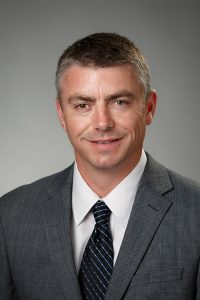To put it simply, Dr. Scott Engel researches people’s behavior.
Of course, if you know any people, you know that people’s behavior tends to drift far from “simple.”
But Dr. Engel and his colleagues at Sanford Research’s Center for Biobehavioral Research have a narrow, deep main focus on the biology and behaviors of two groups of patients: people with eating disorders and people who have had weight loss surgery.
Here’s a look at how the scientists at the Center for Biobehavioral Research are trying to make a difference for patients, how smartphones help with that — and how a small-town farm boy ended up pursuing a Ph.D. and then a research career.
Path to behavior research

Dr. Engel grew up working on his family farm at Fisher, Minnesota, a small town near Grand Forks, North Dakota. It’s directly north of Fargo, North Dakota, which is home to the research center.
Dr. Engel realized early on that farming wasn’t for him. “I was good at breaking things and really bad at fixing them, which is a bad combination on a farm,” he said.
While playing sports in junior college, Dr. Engel found his calling in a psychology class led by an inspiring, “awesome” instructor.
He received his undergraduate degree in psychology and master’s degree in clinical psychology. Engel then realized that he enjoyed doing research over seeing patients in a clinical setting.
So he pursued his Ph.D. in health and social psychology from North Dakota State University. In 1999, he started working with eating disorders at what is now the Center for Biobehavioral Research.
Much of the work Dr. Engel does is behaviorally oriented and doesn’t require test tubes or microscopes, or even a lab. It involves real people reporting about what, and how, they’re doing at a particular time, wherever they are.
For many of the research questions Dr. Engel has, this type of research is preferable to “bringing them into a lab and looking at what’s going on in a pretty sterile, unnatural environment.”
This type of data collection is called ecological momentary assessment. The research center has even developed a platform, ReTAINE (Real Time Assessment in the Natural Environment), for collecting data this way using smartphones. It’s for use by researchers there, for collaboration with others and for sale to still others.
Eating disorder studies and results
The research center works closely with the Sanford Eating Disorders & Weight Management Center in Fargo on several levels. One way is by asking patients if they would be open to participating in a research study.
Then, for example, a bulimia nervosa patient participating in a study about behavior before and after a binge-purge episode could relay information about it — including thoughts and feelings — in real time through their smartphone.
At the end of the study, an analysis of the data collected might reveal new insights that could better help the professionals at the eating disorders clinic and elsewhere relate to, inform and even treat patients.
The research center has published several studies based on data collected before and after an eating disorder behavior episode. These give scientific credibility to the commonly held belief that people engage in an episode when they feel bad in order to help them feel better. The studies confirmed, among other things, that negative emotions or thoughts preceded the behaviors and were especially high right before the behavior.
“And then what you see is that negative emotional state drop off considerably, very quickly after,” Dr. Engel said.
The center also has published a manual for clinicians based on research results. It’s called “Integrative Cognitive-Affective Therapy for Bulimia Nervosa: A Treatment Manual” and emphasizes emotion more than previous interventions.
Weight loss surgery and alcohol
Dr. Engel’s other primary area of focus is weight loss surgery, particularly when the outcome isn’t ideal.
“Most people who have bariatric surgery do great. They lose a lot of weight. It’s life-changing in many ways,” he said.
But not everyone sees the same improvements, or can hang onto the improvements.
“The big-ticket item in the area of bariatric surgery that we’ve been studying is problems with alcohol use and abuse after surgery,” Dr. Engel said.
Based on anecdotes, Oprah Winfrey had raised the concern publicly about 20 years ago. Scientific studies followed that gave a clearer picture of the problem. Dr. Engel and colleagues at the Center for Biobehavioral Research were involved in one study that was published in the Journal of the American Medical Association. The study showed a significant increase in alcohol use disorder after weight loss surgery. Increased risk for problems with alcohol began about two years after surgery.
It’s important to note that most people don’t experience this problem. Additionally, the positive impact from this type of surgery far outweighs the negative for most patients. Still, the increased risk for problems with alcohol is both statistically and clinically significant. For many, the start of alcohol problems first occurs at an age far older than what is typical for a first occurrence of this type.
“As an example, we saw a person who was 54 years old who had never had a problem with alcohol in her life, and all of a sudden, she can hardly drink enough alcohol to keep herself satisfied,” Dr. Engel described. “Many people like her are having problems in practically all areas of their lives — and really significant problems.”
Other alcohol-related studies
Dr. Engel and a colleague are finishing up a five-year project of collecting data on weight loss patients’ changes in alcohol effects from pre-surgery to one year post-surgery. The project’s results will look at cognitive impairment, driving performance and differences in how alcohol moves through the body of a person who has had weight loss surgery.
Other work has shown that the blood alcohol level of patients after surgery peaks much sooner than before surgery. People get drunk more quickly and get far more heavily intoxicated after surgery.
Praise for teams
Scientists at the Center for Biobehavioral Research meet with clinicians at the Sanford Eating Disorders & Weight Management Center to benefit both groups — and patients.
The scientists discuss updates on their behavior research to get a better sense of what it means for patients and how to best share information. This includes the risk of potential alcohol problems after weight loss surgery. The clinicians, ranging from surgeons and nurses to social workers and dietitians, bring up what they’re seeing with patients, which can inspire new research ideas.
“It’s fun to have a team of people who we get to inform and get informed by,” Dr. Engel said.
Dr. Engel also praises the people he has worked with in his past 20 years, since he started at what was then an independent research firm called Neuropsychiatric Research Institute. Kristine Steffen, Ross Crosby, Stephen Wonderlich and Jim Mitchell come to mind as just a few.
“I ended up working here in the first place because the scientists and staff who were working here were doing not only cutting-edge research and great work,” he said, “but also were really great people.”
Learn more
- Using smartphones to understand eating disorders
- After weight loss surgery: ‘Half the man I once was’
- How weight loss surgery improves overall health
…
Posted In Behavioral Health, Grand Forks, Research, Weight Loss
